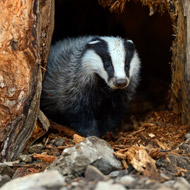
Figure much higher than previously estimated
A freedom of information request by the Badger Trust has revealed that the true cost of the badger cull is even higher than previously thought at just under £7,000 per badger killed.
Figures released by Defra show that the final bill for the taxpayer (including policing costs) is just under £16.8 million, which works out at £6,775 for each badger.
For some time the Badger Trust has been pressing the government for actual costs, but Defra fought hard not to reveal them. In November 2014, the Trust estimated that for the first two years it cost £6,000 per badger - a figure mocked by pro-cull politicians and farming lobbyists, who described it as 'inaccurate and alarmist'.
Commenting on the figures which have now been released by Defra, Dominic Dyer CEO of the Badger Trust said: "Despite the best efforts of the government and the farming lobby to discredit us, our cost estimates were, if anything, too low.
"Not only is the badger cull a disastrous failure on scientific and animal welfare grounds, it is also becoming an unacceptable burden on the taxpayer. When the policy was developed in 2011 the government claimed it would be a farmer led initiative, paid for by farmers. In reality it's the taxpayer who is footing the bill and these costs will continue to rise rapidly as the policy is extended into Dorset, and possibly other counties in the future.
"If, as the former environment secretary Owen Paterson stated in 2013, the badger cull is rolled out to over 40 areas of England the costs to the tax payer could easily exceed half a billion pounds."
News of the total cost of the badger cull comes as the government reveals that it plans to extend the cull to Dorset. In a letter to The Guardian, a group of senior scientists and wildlife experts write of their disappointment that Defra has extended the cull and calls on it to immediately halt their decision:
"The government’s badger culling policy continues to be opposed by the majority of scientific experts, and remains deeply unpopular with a large section of the public.
"There is considerable research evidence and experience demonstrating the central importance of cattle-to-cattle transmission, both within and between herds, in maintaining and disseminating the disease. Control strategies require wider recognition of other factors, including the limitations of the tuberculin test, more rigid cattle movement controls and heightened on-farm bio-security.
"These measures are far more effective at reducing tuberculosis in cattle. Vaccination of both cattle and badgers may also have a role to play."
In response to the cull cost figures, a Defra spokesperson said: “TB poses a huge threat to our farming industry and has cost £500 million over the last decade.
“We are pursuing a comprehensive strategy, including tighter cattle movement controls, badger vaccination and culling in areas where TB is widespread. Costs have been substantially reduced since last year and will be kept under review.”



 The BSAVA has opened submissions for the BSAVA Clinical Research Abstracts 2026.
The BSAVA has opened submissions for the BSAVA Clinical Research Abstracts 2026.